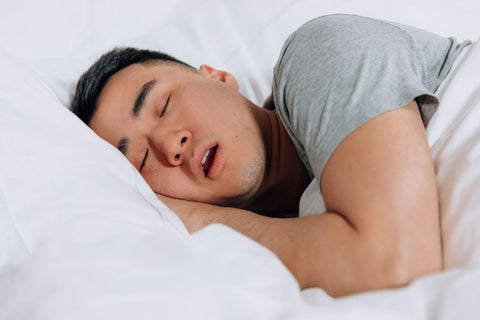Have you ever woken from a dead sleep with a horrendously dry mouth? Chances are you have. Or perhaps you’ve woken up with drool all over your pillow.
Contrary to what you might think, these occurrences may be harming your health, quality of life, and sleep. Why? Because you aren’t supposed to breathe through your mouth (and you aren’t supposed to sleep with your mouth open).
Before we cover the specifics of why mouth breathing is damaging and how to prevent mouth breathing at night, let’s discuss what leads to mouth breathing at night in the first place.
Why Do We Mouth Breathe?
The mouth wasn’t meant to be our main method of breathing. The mouth was designed to help us eat food and speak. While it does serve as a backup for oxygen delivery, it should only be used as a secondary way to breathe in emergencies.
For example, if you got up right now and ran sprints, you may breathe through your mouth if you become especially winded. You shouldn’t, however, breathe through your mouth 24/7.
There are a multitude of causes for mouth breathing. The most common reason is nasal congestion.
When you can’t breathe through your nose due to a blockage, the mouth serves as a backup. Whether your congestion is caused by allergies or illness, the outcome remains the same.

Another possible culprit is a physical obstruction of the nasal passageways, such as a deviated septum. No matter the cause, the more that you breathe through your mouth, the more likely it is to become your “default” breathing method.
And the more you breathe through your mouth, the more congested your nose will stay. Think of the nose like a muscle: use it or lose it.
Mouth breathing leads to a habit that becomes second nature and further inhibits the nose from doing its job: to filter, humidify, and control the temperature of the air you breathe.
Luckily, you can train your body to nasal breathe again. This is vital since mouth breathing leads to a harmful chain of disruptions within the body and mind.
For starters, it causes snoring and compromises your sleep quality.
How Mouth Breathing Harms Sleep Quality
Mouth breathing can wreck your ability to get a good night’s rest. It causes snoring, which leads to daytime fatigue.
When your mouth falls open during sleep, the tissues in your airway fall backward. This leads to an obstruction. The tissues of the airway vibrate together, causing snoring.

Mouth breathing also puts you at a higher risk for sleep disorders such as sleep apnea, which causes breathing to stop and start during sleep.
Mouth breathing also activates a stress response across the entire body. Breathing through the mouth activates the sympathetic nervous system, known for causing “fight or flight” mode.
This process increases the production of the stress hormone cortisol and other stimulating hormones such as adrenaline. This raises blood pressure, causes unnecessary strain on the cardiovascular system, and wears out the adrenal glands over time.
When this stress response is activated, your chances of getting restful sleep dwindle significantly due to the overstimulation created in the body.
Even worse? Mouth breathing can damage the state of your teeth and gums over time. Saliva, which protects the teeth from plaque, bacteria, and germs, dries out when you breathe through the mouth. This renders the teeth defenseless against cavity-causing material in the mouth.
You can prevent the perils of mouth breathing (and improve the state of your sleep quality) by making one simple change: breathe through your nose instead.
How Nasal Breathing Helps You Breathe Easy
We know that mouth breathing activates the sympathetic nervous system and puts stress on the body. Alternatively, the nose activates the parasympathetic nervous system, which is responsible for the opposite effect.
The parasympathetic nervous system causes the “rest and digest” relaxation response. This helps us achieve and maintain deep sleep, slow down our breathing rate, lower blood pressure, and calm the body and mind.
Something as small as the nose activates such a vital bodily response thanks to a molecule called nitric oxide.

Nitric oxide is a vasodilator known to boost the immune system, reduce inflammation, improve gut function, reduce anxiety, improve memory, relieve pain, and more.
The nose also primes the air before it is received by the lungs thanks to the lubrication and filtration that takes place within the nostrils.
This process adds moisture back into the sinuses and blocks harmful particles and germs, making it easier for the body to oxygenate itself. This also prevents illness and disease.
By just breathing through the nose, you can put your health (and sleep) on the fast track to improvement. But how do you break the seemingly involuntary habit of mouth breathing?
Breaking the Habit of Mouth Breathing
The first step toward learning how to prevent mouth breathing at night is to stop mouth breathing during the day.
Make a conscious effort to be mindful of your breath. If you need a reminder, set an alarm every hour to check your breathing.
To begin to make the switch, you must first understand the difference between poor tongue posture and proper tongue posture.
Poor tongue posture allows for mouth breathing, while proper tongue posture doesn’t. Your tongue should rest all the way up on the roof of your mouth within the upper palate, closely behind the teeth.
The teeth should remain slightly parted, while the lips should be sealed. When you maintain this posture, mouth breathing is virtually impossible.
If your nose is too congested to attempt this switch, decongest with some Buteyko breathing exercises.
@somnifix Congested? Try this hack from @solsticeyoga 🤧 #buteykomethod #breathwork #airwayhealth #decongest
♬ original sound - THXOC
Once you’ve mastered how to stop mouth breathing during the day, you can move on to learning how to prevent mouth breathing at night.
Sleeping on your side may provide some relief, as well as certain pillows designed specifically to keep you physically propped up to prevent airway obstructions.
Physical aids such as nasal dilators may help to open up the nostrils while you sleep, preventing congestion and promoting nasal breathing.
If you experience severe mouth breathing, snoring, and/or sleep apnea, you may need a Continuous Positive Airway Pressure machine, known as a CPAP. You must receive a sleep test to determine whether this machine is necessary.

Although these suggestions may help when learning how to prevent mouth breathing at night, they don’t address one of the main problems: an improper lip seal.
Fancy pillows, nasal dilators, and even sleep apnea machines don’t physically stop your mouth from falling open. That means mouth breathing is still possible.
Mouth tape, however, offers a proper lip seal that makes mouth breathing virtually impossible.
Pop a strip of mouth over your lips to nasal breathe your way to improved sleep. Better yet, mouth tape can be used in combination with a nasal dilator and/or CPAP machine.
Our specially designed strips turn the dream of nasal breathing at night into a reality.
Tape Your Way to Restful Sleep With SomniFix
If you’re on the journey of learning how to prevent mouth breathing at night, mouth tape is a must. But any tape you may have on hand won’t do.
Most household tapes are created with chemicals in the adhesive that cause irritation of the skin. And chances are, they aren’t very comfortable to wear.
Alternatively, SomniFix is made with a flexible and hypoallergenic, latex-free material. Our gel adhesive allows for a comfortable experience, so you’ll forget you’re even wearing tape while you sleep.

Restful sleep doesn’t have to remain a dream. Start taping your way toward the restful sleep you deserve tonight.



